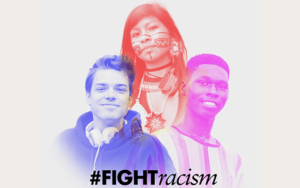The United Nations on the occasion of
International Day for the Elimination of Racial Discrimination
Voices for action against racism

The 2022 edition of the International Day focuses on the theme “VOICES FOR ACTION AGAINST RACISM”. This edition aims, in particular, at: highlighting the importance of strengthening meaningful and safe public participation and representation in all areas of decision-making to prevent and combat racial discrimination; reaffirming the importance of full respect for the rights to freedom of expression and peaceful assembly and of protecting civic space; and recognizing the contribution of individuals and organizations that stand up against racial discrimination and the challenges they face.
This simple message can be a powerful vehicle to encourage people everywhere to strengthen and consolidate their voices against racism, to mobilise against all forms and manifestations of racial discrimination and injustice, and to ensure a safe environment for those who speak up. It lends itself towards telling personal interest stories and can feature people and populations from across the world.
This theme draws also inspiration on the High Commissioner’s report on racial justice and the Agenda Towards Transformative Change for Racial Justice and Equality: “LISTEN UP: Ensure that people of African descent and those who stand up against racism are protected and heard, and their concerns are acted on”.
Background
The International Day for the Elimination of Racial Discrimination is observed annually on the day the police in Sharpeville, South Africa, opened fire and killed 69 people at a peaceful demonstration against apartheid “pass laws” in 1960.
In 1979, the General Assembly adopted a programme of activities to be undertaken during the second half of the Decade for Action to Combat Racism and Racial Discrimination. On that occasion, the General Assembly decided that a week of solidarity with the peoples struggling against racism and racial discrimination, beginning on 21 March, would be organized annually in all States.
Since then, the apartheid system in South Africa has been dismantled. Racist laws and practices have been abolished in many countries, and we have built an international framework for fighting racism, guided by the International Convention on the Elimination of Racial Discrimination. The Convention is now nearing universal ratification, yet still, in all regions, too many individuals, communities and societies suffer from the injustice and stigma that racism brings.
Principle of equality
The United Nations General Assembly reiterates that all human beings are born free and equal in dignity and rights and have the potential to contribute constructively to the development and well-being of their societies. In its most recent resolution, the General Assembly also emphasized that any doctrine of racial superiority is scientifically false, morally condemnable, socially unjust and dangerous and must be rejected, together with theories that attempt to determine the existence of separate human races.
The United Nations has been concerned with this issue since its foundation and the prohibition of racial discrimination is enshrined in all core international human rights instruments. It places obligations on States and tasks them with eradicating discrimination in the public and private spheres. The principle of equality also requires States to adopt special measures to eliminate conditions that cause or help to perpetuate racial discrimination.
Major UN meetings and events
In September 2021, the United Nations General Assembly brought together world leaders for a one day meeting in New York to mark the twentieth anniversary of the adoption of the Durban Declaration and Programme of Action under the theme of “Reparations, racial justice and equality for People of African Descent.”
In 2001, the World Conference against Racism produced the most authoritative and comprehensive programme for combating racism, racial discrimination, xenophobia and related intolerance: the Durban Declaration and Programme of Action (DDPA). In April 2009, the Durban Review Conference examined global progress made in overcoming racism and concluded that much remained to be achieved. Undoubtedly, the greatest accomplishment of the conference was the renewed international commitment to the anti-racism agenda.
In September 2011, the United Nations General Assembly held a one day high-level meeting in New York to commemorate the 10th anniversary of the adoption of the Durban Declaration and Programme of Action. There, world leaders adopted by consensus a political declaration proclaiming their “strong determination to make the fight against racism, racial discrimination, xenophobia and related intolerance, and the protection of the victims thereof, a high priority for [their] countries.”
Coming as it did during the 2011 International Year for People of African Descent, the 10th anniversary was a chance to strengthen political commitment in fighting racism and racial discrimination.
On 23 December 2013, the General Assembly proclaimed the International Decade for People of African Descent commencing 1 January 2015 and ending on 31 December 2024, with the theme “People of African descent: recognition, justice and development.”


